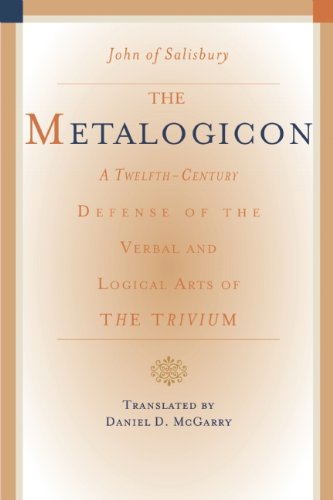An 11th Century View of Science
The chief aids to philosophical inquiry and the practice of virtue are reading, learning, meditation, and assiduous application. Reading scrutinizes the written subject matter immediately before it. Learning likewise generally studies what is written, but also sometimes moves on to what is preserved in the archives of the memory and is not in the writing, or to those things that become evident when one understands the given subject. Meditation, however, reaches out farther to what is unknown, and often even rises to the incomprehensible by penetrating, not merely the apparent aspects, but even the hidden recesses of questions. The fourth is assiduous application. The latter, although it owes its form to previous cognition, and requires scientific knowledge, still smooths the way for understanding since, in itself, it constitutes “a good understanding for all who do it.” The heralds of the truth, it is written, “have proclaimed the works of God, and have understood His doings.” Scientific knowledge, by the nature of things, must precede the practice and cultivation of virtue, which does not “run without knowledge where it is going,” and does not merely “beat the air” in its battle against vice. Rather “it sees its goal, and the target at which it aims.” It does not haphazardly chase ravens with a piece of pottery and a bit of mud. But scientific knowledge is the product of reading, learning, and meditation. It is accordingly evident that grammar, which is the basis and root of scientific knowledge, implants, as it were, the seed [of virtue] in nature’s furrow after grace has readied the ground. This seed, provided again that coöperating grace is present, increases in substance and strength until it becomes solid virtue, and it grows in manifold respects until it fructifies in good works, wherefore men are called and actually are “good.” At the same time, it is grace alone which makes a man good. For grace brings about both the willing and the doing of good. Furthermore, grace, more than anything else, imparts the faculty of writing and speaking correctly to those to whom it is given, and supplies them with the various arts. Grace should not be scorned when it generously offers itself to the needy, for if despised, it rightly departs, leaving the one who has spurned it no excuse for complaint.
Notes:
Science is a prerequisite to virtue, requiring study, application, and meditation dependent on grammar.
Folksonomies: logic classical thinking inductive reasoning
Taxonomies:
/hobbies and interests/reading (0.708322)
/society/unrest and war (0.394324)
/art and entertainment (0.222881)
Keywords:
scientific knowledge (0.951092 (positive:0.371474)), 11th Century View (0.828588 (positive:0.354763)), assiduous application (0.826541 (positive:0.315052)), written subject matter (0.793184 (neutral:0.000000)), virtue (0.749491 (positive:0.395374)), solid virtue (0.686403 (positive:0.596860)), philosophical inquiry (0.674505 (positive:0.277100)), hidden recesses (0.671755 (negative:-0.314032)), apparent aspects (0.667336 (negative:-0.289119)), generally studies (0.666429 (neutral:0.000000)), Science Science (0.664699 (positive:0.354763)), previous cognition (0.658842 (neutral:0.000000)), meditation (0.651502 (positive:0.328600)), various arts (0.649931 (neutral:0.000000)), grace (0.643370 (positive:0.551429)), good understanding (0.641483 (neutral:0.000000)), good works (0.630578 (positive:0.549829)), grammar (0.566736 (neutral:0.000000)), practice (0.566656 (positive:0.277100)), things (0.563976 (neutral:0.000000)), nature (0.560729 (positive:0.304285)), seed (0.553919 (neutral:0.000000)), prerequisite (0.542674 (positive:0.354763)), heralds (0.536817 (neutral:0.000000)), study (0.534298 (neutral:0.000000)), excuse (0.533864 (negative:-0.519605)), manifold (0.532391 (positive:0.549829)), archives (0.531420 (negative:-0.242957)), memory (0.531397 (negative:-0.242957)), chief (0.531001 (positive:0.277100))
Entities:
Grace:Person (0.985163 (positive:0.399603)), View of Science Science:PrintMedia (0.730131 (positive:0.354763))
Concepts:
Knowledge (0.981970): dbpedia | freebase
Science (0.950167): dbpedia | freebase | opencyc
Understanding (0.944470): dbpedia | freebase | opencyc
Scientific method (0.843864): dbpedia | freebase
Theory (0.791577): dbpedia | freebase
Epistemology (0.753241): dbpedia | freebase | opencyc
Nature (0.700927): dbpedia | freebase | opencyc
Religion (0.636653): dbpedia | freebase | opencyc





